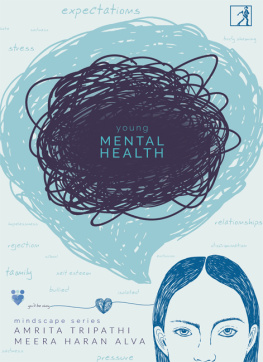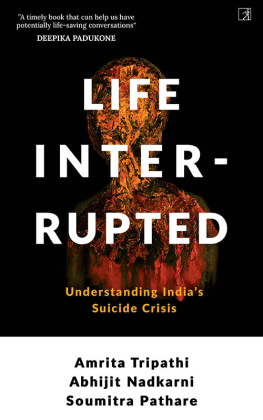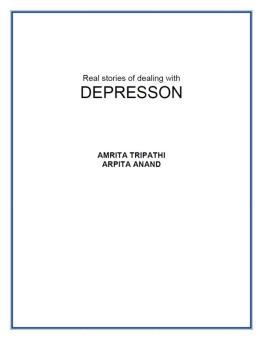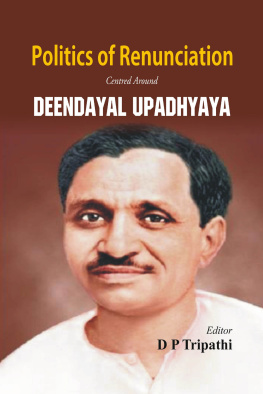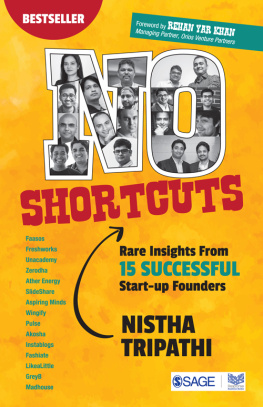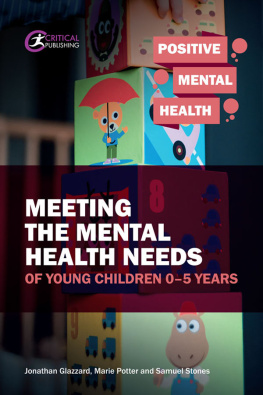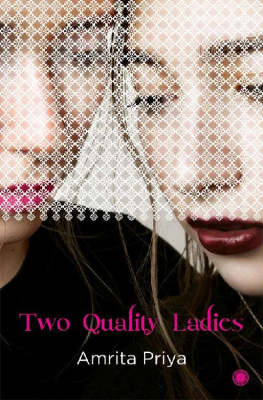Amrita Tripathi - Young Mental Health
Here you can read online Amrita Tripathi - Young Mental Health full text of the book (entire story) in english for free. Download pdf and epub, get meaning, cover and reviews about this ebook. year: 2020, publisher: S&S India, genre: Home and family. Description of the work, (preface) as well as reviews are available. Best literature library LitArk.com created for fans of good reading and offers a wide selection of genres:
Romance novel
Science fiction
Adventure
Detective
Science
History
Home and family
Prose
Art
Politics
Computer
Non-fiction
Religion
Business
Children
Humor
Choose a favorite category and find really read worthwhile books. Enjoy immersion in the world of imagination, feel the emotions of the characters or learn something new for yourself, make an fascinating discovery.
- Book:Young Mental Health
- Author:
- Publisher:S&S India
- Genre:
- Year:2020
- Rating:4 / 5
- Favourites:Add to favourites
- Your mark:
- 80
- 1
- 2
- 3
- 4
- 5
Young Mental Health: summary, description and annotation
We offer to read an annotation, description, summary or preface (depends on what the author of the book "Young Mental Health" wrote himself). If you haven't found the necessary information about the book — write in the comments, we will try to find it.
Young Mental Health — read online for free the complete book (whole text) full work
Below is the text of the book, divided by pages. System saving the place of the last page read, allows you to conveniently read the book "Young Mental Health" online for free, without having to search again every time where you left off. Put a bookmark, and you can go to the page where you finished reading at any time.
Font size:
Interval:
Bookmark:

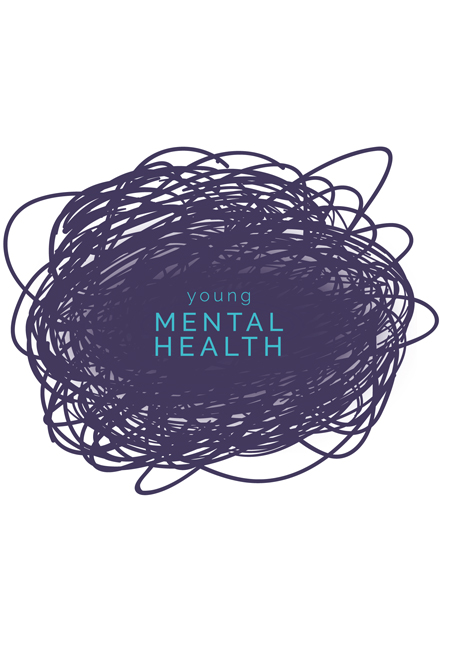
young
MENTAL HEALTH
AMRITA TRIPATHI
MEERA HARAN ALVA

FOREWORD BY DR AMIT SEN
I remember when I decided to pursue psychiatry after becoming a doctor and announced it to my family my Didima/Nani (maternal grandmother), who was amongst one of my favourite persons, was aghast. After all these years of hard work and toil, you want to become a pagoler dactar (Bangla for lunatics doctor)?! Back in the 1980s, psychiatry was a poor choice to make from every angle, whether it was social status, financial returns, or the cynicism with which it was viewed amongst our own medical fraternity.
A lot has changed since then, not least in the way mental health problems have sky-rocketed, but much more in the way the world has started looking at it. The notion that mental illness can only happen to another person or family and not me or mine, is beginning to shift significantly. Rather than seeing it as an incomprehensible experience happening to the other, people have started seeing it as a realistic possibility in their own lives. Media articles and stories, testimonials from famous people, cinema, literature, poetry and music have all started expressing and highlighting it as a real life experience that could happen to anybody. Mental health professionals too have started shifting their stance increasingly, from perceiving and interpreting mental illness from a purely medical and expert-driven model to a psychosocial model that is collaborative and respectful. There is a growing understanding that trying to manage mental health difficulties in hospitals and clinics by experts is going to only touch the tip of the iceberg, and that we need to reach out to the larger community to make a broader and deeper impact.
While there have been encouraging strides in adult mental health, including the new Mental Health Care Act, 2017 in India, which is sensitive, inclusive and empowering of people suffering from mental illnesses, the children of the country have not got their due. The laws of the land, including the Juvenile Justice Act (JJ Act) 2015, and Protection of Children from Sexual Offences (POCSO) 2012, which are guided by principles of child rights and protection, are comprehensive and robust, but their implementation is woefully lacking or short-sighted and punitive. The reason for this is a poor understanding of childrens needs and the abject lack of resources, I believe. The fact that healthy mental (and physical) development of a child is a dynamic process that depends upon the complex interplay between their temperament, their ever-changing needs as they grow and the turbulent world around them, is a challenging concept to grasp. The strife-ridden socio-political imbroglio that threatens to enter our homes today, coupled with the changing family structure, urbanisation, intense competitiveness in education, the impact of social media and the prevailing uncertainty that all this creates only makes it that much more difficult to understand.
Is it any wonder that one in four young people are now known to suffer from clinical depression before they turn 18, that cutting oneself has become a common method of expressing distress, that substance use is rampant in schools and colleges as a way of coping with stress, that body image and eating habits occupy young peoples minds in obsessive forms, that confusion surrounding gender and sexuality makes the young and the old take up polarised and litigious positions?
In India, the situation is particularly fractious, as we are confronted with disturbing events and statistics that shake the foundation of our collective belief that we are a family-oriented and child-centric society. How can we explain that, as a country, we have one of the highest rates of child sexual abuse if we are indeed protective of our children?! India also has one of the highest suicide rates amongst young people in the world; suicide is the number one cause of death in young people between the ages of 15 and 29 (38 per 1,00,000).
To say that the scenario is alarming would be an understatement. If we really hope that this young generation will take us to a promising future, all stakeholders will need to do something transformative to help them achieve it. What we need is a movement that will challenge institutions, revolutionise systems and change the very language that we use to speak to and about our children.
In this context, this book is timely and much needed. The fact that it has attempted to look at child and adolescent mental health from different lenses, both expert and non-expert, is refreshing, and provides the reader various choices to align to or learn from. While it has taken from research at esteemed institutions, it has also sensitively explored the story of an adolescent struggling with sexuality and depression. Innovative models created by young therapists and community based interventions reaching out to thousands and more are insightful and exciting. The authors have been able to successfully weave together a tapestry of ideas, experiences and evolving models of prevention and care that are relevant and inspiring. Their desire to inform and passion to transform is palpable.
The biggest achievement of this book, I believe, is that it can arouse the curiosity in a sceptical adolescent as much as it can engage the cynical professional. I sincerely hope that it reaches tens of thousands, young and old, who need to go through this compelling book.
March 2020
New Delhi

INTRODUCTION
Amrita Tripathi
The idea behind the Mindscape series, which kicked off with the title Real Stories of Living with Depression, was to share stories of lived experiences that might resonate with others, and centre the narrative of mental health and mental illness firmly in India that is, to look at stories, shared experiences and expert views, with an India lens. We want to learn how to talk about mental health and mental disorders, about stress and emotional triggers, about complicated and often-life-altering diagnoses in a less complicated way.
We want to share stories and learnings and talk to experts, all the while understanding that there is an increasing push to focus on the psycho-social aspect of mental illness, that there is no one-size-fits-all model of diagnosis and care, and that the narrative needs to be centred around and led by those of us living with a given condition or diagnosis, who are as much the experts on their lives, as the psychologists and psychiatrists who have made it their lifes work.
We want to do this in a way that is accessible and conversational, not overwhelming the reader with technical jargon. We also want this book to provide an entry point for the layperson interested in mental health, focusing on Young Mental Health, and providing a fairly structured narrative, with links for additional reading and more resources at the end.
So how do we go about this admittedly daunting challenge?
First, by facing the facts.
You cant start doing any research on mental health in India without bumping into startling, even painful statistics the disease burden, lack of resources, and shockingly low numbers of trained professionals.
Next pageFont size:
Interval:
Bookmark:
Similar books «Young Mental Health»
Look at similar books to Young Mental Health. We have selected literature similar in name and meaning in the hope of providing readers with more options to find new, interesting, not yet read works.
Discussion, reviews of the book Young Mental Health and just readers' own opinions. Leave your comments, write what you think about the work, its meaning or the main characters. Specify what exactly you liked and what you didn't like, and why you think so.

